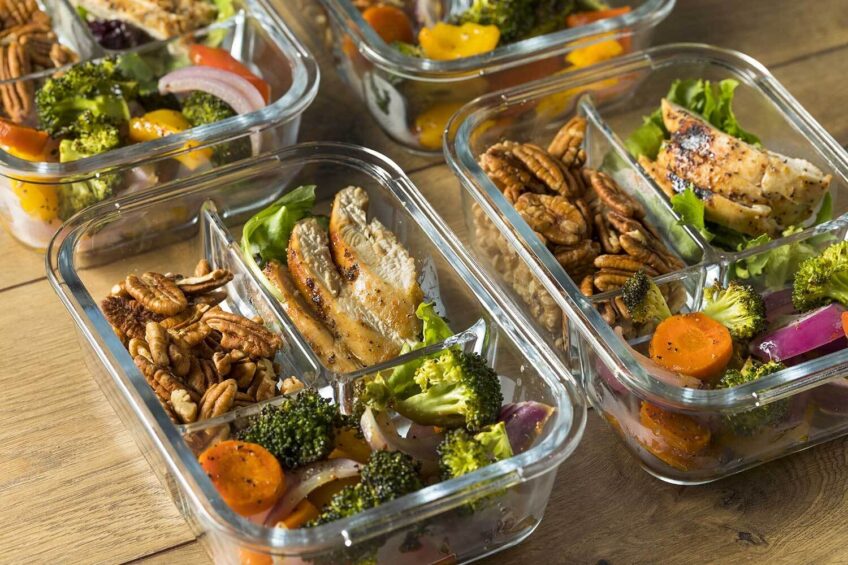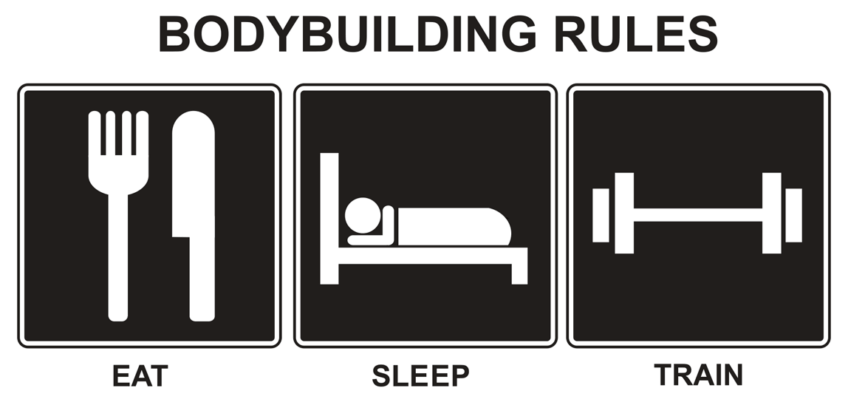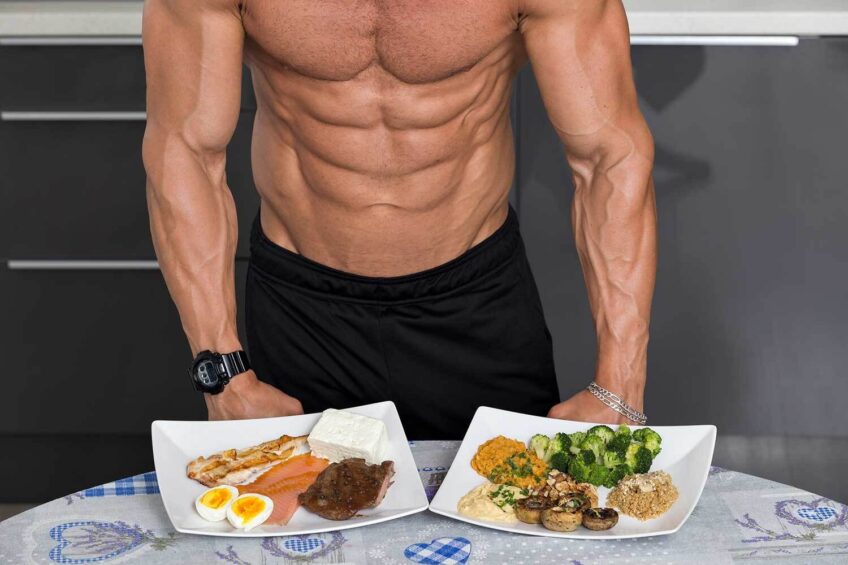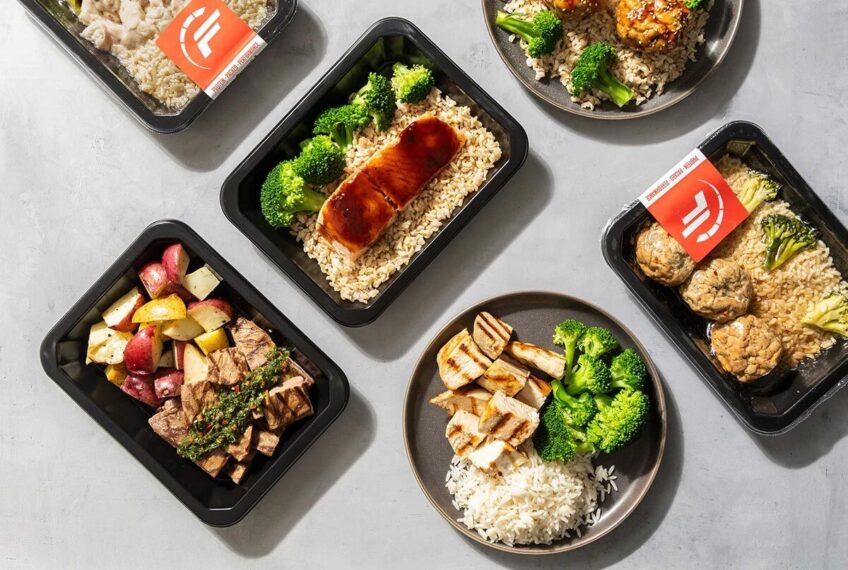Bulking Season - What's a Healthy Bulking Diet Plan?
There are 3 rules to bodybuilding: Eat, Sleep, and Train. This article is about the first rule and how you can maximize bulking season to your benefit!

I woke up this morning with a smile on my face.
The morning itself was pretty uninspiring. You know, the one where you open the curtain to a grey, overcast sky, the type of sky that looks like it could turn into torrential rain in a heartbeat, windy, and the kind of day you just want to stay in bed.
The days were getting longer, and the weather was more gloomy. Something was coming.
However, this was not the time to be gloomy. Quite the opposite, I looked upon that gray cloud with a grin, chuckling as I entered the shower.
Why am I so happy? I hear you ask.
Well, the cold, dark days mark the arrival of my two favorite seasons. Winter is one of them.
The start of the winter period marks an extraordinary time in the calendar. A time that some look towards with dread in their hearts. To others, however, myself included, the start of winter is the equivalent of a religious holiday.
The holy grail of weightlifting. During this time of year, we get to start eating more, lifting heavier, and packing on some serious mass. No more starving ourselves for washboard abs, no more cardio (or a lot less…), and no more long sets.
Have you guessed what the other season is yet?
That’s right. Winter marks the start of BULKING SEASON.
What is Bulking Season?
I imagine that many of you are grinning as you read this. Some of you are probably wincing too. Let me explain the basics of bulking and cutting seasons for those of you who are asking what I am talking about.
For those of you who have just begun the holy quest of sculpting your body into one that makes the opposite sex swoon, I applaud you. Welcome to the club.

Make sure you are paying attention here as I am about to impart the most important rule of bodybuilding - EAT.
We are talking about knowledge equal to that of Einstein’s theory of relativity. This law is the foundation for building muscle and losing fat. If you do not know it, you cannot do either effectively. This is proven science.
Here it is.
To Gain Muscle, You Must Consume More Calories Than Your Body Expends.
To Lose Fat, You Must Consume Fewer Calories Than Your Body Expends.
That is it.
Although many factors can influence short-term growth or loss, in the long run, this is the only sustainable way to change your body's composition consistently. This means that, unfortunately, you cannot lose weight/fat and build muscle at the same time. There are those with odd exceptions.
As a beginner, you will experience “Beginners Gains.” During this period, usually around the first 3-6 months of training seriously, you can lose weight while building muscle. This does not last forever, though, and after this period has stopped, you will be a slave to the laws above like the rest of us.
The other exception is when you use steroids to change your hormone levels. While I'm not entirely against steroid use, it's for another article.
Now that you know the laws, you might be able to work out what bulking/cutting seasons are. If not, don’t worry. Let me explain.
To build bigger muscles, which look impressive, we have to work with the first part of the law. We must eat more calories than our body expends.
If you eat correctly and pair it with a good gym routine, you will add size, strength, and mass to your muscles. The one drawback here is that, unfortunately, when we eat more calories than we burn, we gain fat and muscle mass.
However, if you do this correctly, you will gain more muscle than fat.
We do this for a set period of time. This period is our Bulking Season. During this time, we get to eat more, lift heavier weights, and see great muscle gains. This is why many of us love the bulking season. I love food. I love lifting heavy weights, and I love having big muscles and intense pumps.
After Bulking Season is over, if we have done it correctly, we will probably have gained a good amount of muscle mass and size, as well as a little bit of fat.
Now, we move over to Cutting Season, where we start to use the second part of the law.
We aim to lose as much of what we have gained during Bulking Season while keeping as much of that hard-earned muscle mass. To do this, we go into a calorie deficit.
We eat slightly less than our bodies consume during the day. By pairing this with an excellent cutting gym routine, we should lose fat much quicker than our muscles.
Then we rinse and repeat. We are repeating this cycle over and over. Each time, we will enter the bulking stage with a little bit less fat and the cutting phase with a little bit more muscle. Over time, this will lead to us having a great shredded physique during our cuts and huge impressive muscles during our cuts.
How Do I Bulk Correctly?
Every day I see people in the gym who are bulking wrong. Too many novice lifters think that they need to eat as many calories as possible during their bulking season. In theory, you need this to grow massive muscles, right?
Well, sure, more calories will lead to more significant muscle gains. It also leads to much more fat. If your goal is to be as strong as possible, and you don’t care about your aesthetics, then sure, as long as you eat healthy calories, go ahead.
If, like the rest of us, you want to look great simultaneously, your bulking season needs to be much more controlled.
You do not want to put on too much fat during your bulking season; otherwise, during your cutting season, you will have to spend the entire time losing that fat as well as your muscle.
The result?
You end up more or less where you started. You have just wasted a year of training to look exactly the same.
To bulk correctly and in a healthy manner, you must control your food and your routine. This article is designed to help you with your diet during your bulking season, so I will not go into the best bulking workout routines.
Healthy Bulking Diet Plan
Having a great physique requires willpower, motivation, grit, and, surprisingly, quite a lot of math.
To start with, if you are not already, you need to start tracking what you eat. There are several great apps out there to help you do this.
My go-to app for tracking food, workouts, and macro-nutrients (More on those in a minute) is MyFitnessPal. Download the app and input what you are eating. MyFitnessPal has a massive database of foods, so it should be straightforward to use. You can even scan the barcode on any food you eat.
Once you start tracking your food over a couple of weeks, you should be able to gauge roughly how many calories you eat on average daily.
Next, you should look online to calculate your total daily calorie expenditure. I would advise using this calculator by Body Building. It is spot on 95% of the time.
When you have worked out your daily calorie expenditure, say 2800, you next need to try to hit that number for 2-3 weeks. We call this a maintenance stage. It preps you for either a bulking or a cutting season and should be done at the swap over the point of both.
After you have nailed those exact calories for 2-3 weeks and feel you have it dialed in, you should aim to add around 500-800 calories during your bulk. In reverse, you would reduce by 500-800 calories for a cutting season. Simple, right?
As a rule, you should always spread your meals over at least 5 different mealtimes. For me, 7 is the optimum number of meals in a day.
Macros
When creating a diet plan, your first focus will be calorie control, and second to that is your Macronutrients. There are 3 macronutrients and a range of micronutrients. As a beginner, I would advise focusing on dialing in your macros before you even start looking at your micros (micronutrients).
Macronutrients are split into three: Proteins, Carbohydrates, and Fats.

All of your food has a composition of one or more of these macros. Chicken, for example, is pure protein, brown bread, mainly carbohydrates and olives, and almost 100% fat.
I won’t go into too much detail about macronutrients and their importance here, as I don’t want to ramble too much about the science. If you're going to read more about it, this article is fantastic.
Now, what you are going to do is split your calories into macro percentages.
The most common bulking is 40% carbs, 40% Protein, and 20% Fat. If your daily calories are 2800, you might want to hit 1200 calories from healthy carbohydrates, 1000 calories from high-quality proteins, and 800 calories from healthy fats.
This is where MyFitnessPal shines. You can set these macro percentages as your goal, and as you input your food during the day, it will keep track for you.
Bear in mind that these percentages are just the suggested starting point. You should continuously adjust them as everybody has different ideal macro percentages.
Example of a healthy bulking meal plan
Here is an example of what I eat during a typical day while bulking.
Breakfast - Egg Whites + Turkey + Milk + Spinach
Morning Snack - Wholemeal Beef Sandwich + Milk
Lunch - Chicken Breast + Brown Rice + Broccoli
Afternoon Snack - Protein Bar or Protein Shake
Pre-Workout Meal - Protein Shake + Banana
Dinner - Steak + Broccoli + Spinach + Brown Rice + Milk
Evening Snack - Casein Shake + Blueberries
I change it around a lot, but this should give you a rough idea of how you should be eating during your bulk.
As you can see, there is a lot of simple but high-quality food in that plan. I know it looks dull, but the results you will see from dialing your diet should more than reward you.
However, most of us don't immediately start with meal prep. Getting a subscription to a meal plan is a great way to commit to a bulking diet without the hassle of knowing exactly what to make.
That's where Fuel Meals comes in. Yes, that's a sponsored link with 40% off your first order applied at checkout!

Their Muscle Gain Plan is excellent and has a daily average of 2750 calories, just shy of our 2800 example.
They have simple plans, use hormone and anti-biotic-free meat, and don't use any preservatives.
Supplementation
I always leave supplementation until last when discussing any weightlifting diet. Supplementation should only ever be implemented to “supplement” your diet.
I see too many people who spend hundreds on different supplements while their diet is utter garbage. Yes, pre-workout shakes are awesome, they help you work out harder, but all that extra work is wasted if your diet isn’t in check.
Advanced bodybuilders can use a huge variety of supplements to enhance their workouts. I would not suggest buying a whole medicine cabinet full of supplements for most people. Save that money for high-quality meat and veggies.
There are several supplements I do suggest everybody buys, however:
Protein Shake
Getting enough protein is one of the most challenging aspects of any bulking plan. Luckily, protein powder is a cheap and effective way to increase protein consumption. I suggest you buy a good quality whey protein, as you will be drinking this a lot, and good casein, which is the perfect shake for before bed due to its slow release.
Multivitamins
It is nearly impossible to reach the recommended dose of all the vitamins and minerals your body needs through food alone. To do so would take an extreme level of planning and would cost a fortune day to do. This is where multivitamins come in.
A good multivitamin covers you for most daily vitamins at a much more cost-effective price.
There are other must-have workout supplements to consider.
Tips & Tricks
- Frozen veggies, meat, and fish are an easy way to keep costs down and stay prepared (fresh and organic are preferred).
- Nuts are a great source of fatty acids; they also contain good protein levels.
- Swapping water for milk is an easy way to up your calories throughout the day.
- Daily quality protein shakes will help you out in your day-to-day macro-management.
My Thoughts?
As a beginner, it can be really easy to mess up your bulking season; bro-science and poor education can lead to monumental errors.
Do not let this put you off, though, when you finish a bulking season correctly, and it is immensely satisfying. Flexing and getting bigger biceps, you have grown by 2 inches, and hitting PRs in your heavy lifts is the reason we do this.
So, go!
Enjoy your winter bulking season!
Enjoy eating more, lifting heavier, and growing some big ass muscles because when the cutting season comes, the memory of those bulking season meals will be the only fuel you get.
Tony Lee, MS, RD
Tony Lee, RD, MS, is a highly qualified and accomplished Registered Dietitian with a Master’s Degree in Nutrition Sciences. Tony brings over two decades of experience in dietetics, specializing in sports nutrition. Interests include studying all aspects of wellness, fitness, genetics, and peak health performance.










